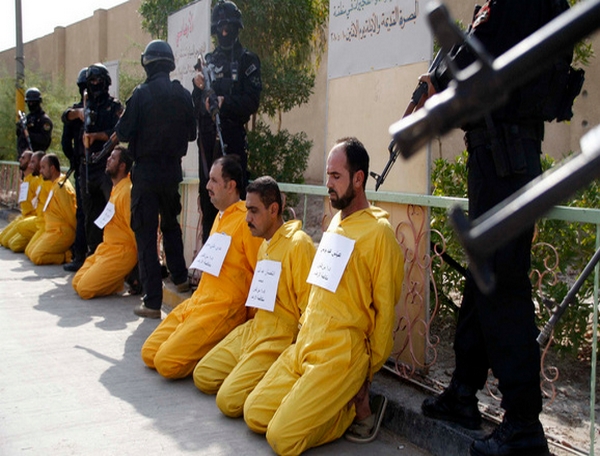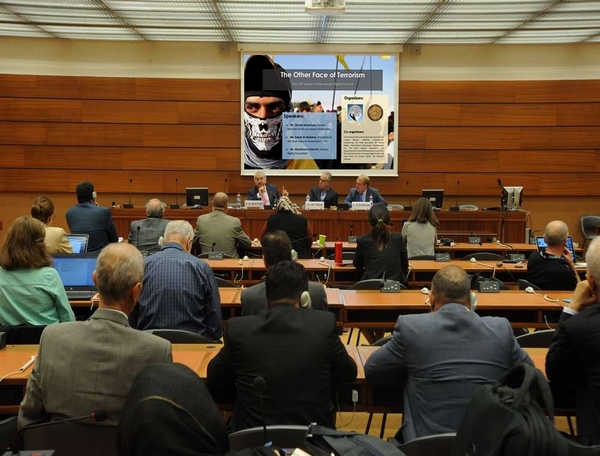System of Death (II): The Road to
Partition
Part Two of this series looks at the fatal consequences the US occupation of Iraq has had on the country’s religious minorities, who have almost no stake in the sectarian system that now governs the country.
What started out as a punching bag for jokes, when it permeated that former US President George W. Bush didn’t know the difference between Sunni and Shia, has over time turned Iraq into a sectarian nightmare. False divisions into a “Kurdish north,” “Sunni triangle,” and “Shia south” acted not only as reductionist descriptions that helped make the phenomenon of embedded coverage on a much more complex reality easier. They also helped pave the way for sectarian killing, division, and the creation of sect-based and ethnic enclaves. The end result? The sustained threat of partition for Iraq.
Christians, Mandeans, Yazidis, Jews, Zoroastrians, and Shabaks were just some of the groups that simply did not fit into the Kurdish-Sunni-Shia construct proposed for post-invasion Iraq. Other sizeable groups whose exclusion from the new order meant mass death and forced flight included Palestinian refugees, who had long enjoyed better protection in Iraq than they did in most other Arab states. Shias, Sunnis, and Kurds (most of whom are Sunni) have also suffered massive casualties since 2003, and the lack of protection offered to minorities is a reflection of attacks on all Iraqis’ rights. But through almost a decade of war, the systematic nature of the persecution suffered by religious and ethnic minorities has stood out.
Across the board, patterns of decimation showed with every year of occupation that passed. Estimated to number a few hundred in 2003, five years later there were only 10 to 15 Jews in Iraq, according to a Brookings Institution-University of Bern paper published in 2008. While Mandeans numbered around 30,000, their numbers had shrunk to 13,000. The number of Palestinians in Iraq shrank from 35,000 in 2003 to 15,000 in 2008, according to the same paper.
Since 2008, the situation of minorities has by no means improved, even though casualties as a result of sectarian war in 2006-7 meant there was significant media coverage of the targeting of vulnerable groups. In 2011, head of the Rafidain parliamentary bloc Unadim Kana was quoted as describing the situation of Iraqi minorities as “tragic.”
But no real judicial investigation has been carried out, in spite of the sustained, systematic violence suffered by such groups. As such, crimes against Iraq’s minorities remain unprosecuted, permanently damaging the country’s demographic make-up.
Iraqi Christians in the Eye of the Storm
Just as dramatic as the fate of other religious minorities, was the reduction of Iraq’s Christian population by half since 2003, due to killing and forced flight, according to Iraqi human rights activist Souad al-Azzawi. Some estimates go further, warning that Iraq’s Christian population may have shrunk from 1.4 million to approximately 600,000. Starting from early in the occupation, dozens of churches were targeted for attack, with the occupying forces doing nothing to protect them. Particularly in 2004, dozens of Christian religious figures were targeted for kidnapping and killing, leading to the instilling of collective panic among other faithful.
Answers to the question of who specifically was behind their targeting vary from one location of Iraq to another, and from one period of the occupation to the next. But activists have consistently pointed to the occupying forces’ obligations under international humanitarian law to protect the civilian population of the country they are occupying. By institutionalizing sectarianism, what the occupation achieved was the total opposite of its duties under international law.
“The Christians were targeted by Iraqi extremists and the US occupation together,” said Lucien Jamil, an Iraqi priest who campaigns for Christians’ rights. “The occupation empowered political minorities to take control of the country on its behalf. Shias and Sunnis who accepted to work with the occupying power from within the confines of the Green Zone constituted political minorities who were given power in order to balance each other out, while killing opponents to the occupation.”
Christians, he added, and by default other non-represented religious minorities, did not have any authority to resort to when faced with violence. “The occupation worked to normalize and legalize that which cannot be normalized,” said Jamil. “The Christians, who did not even set out to oppose the occupation to begin with, simply did not have the political weight to defend themselves as a minority.”
Part of the conundrum faced not only by Christians but by millions of Iraqis from 2003 onwards, was born from the lack of any real culture of categorizing people into majorities and minorities. “Politically speaking, we thought of ourselves as Iraqi and Arab, not as Christian,” said Jamil. In spite of the sea-change in Iraqi politics, no political group with any real grassroots legitimacy emerged to give a voice to Christians in the country’s new sectarian system.
“Iraqi Christians who became politicians in post-invasion Iraq could not really represent us, because they worked with the occupying power. To us they are like cartoons. They’re not real.” Jamil added that, in the ultimate twist of irony, many of the new Christian politicians were in fact “de-frocked Baathists who decided to work with the occupier, and to make the most of the new order.”
Political initiatives proposed on behalf of the Christian population included multiple calls for theestablishment of an autonomous region for their beleaguered minority. While the call acted as a reflection of the Iraqi Christians’ suffering, it also toed the occupation-injected partition instinct. “The occupation has changed the structure of the country completely for Christians and other denominations,” said Jamil. “But I still believe that the best way forward for Iraq’s Christians is to work together with other movements that genuinely strive for the autonomy of Iraq – not its splitting.”
Sectarianism Until Partition
Following the withdrawal of US troops in December 2011, there was a surge in generalized violence, affecting people from all across the country. In recent months, this surge has involved multiple coordinated bomb attacks. On March 20, multiple blasts across the country left scores dead and hundreds injured. On January 5, at least 72 people were killed in coordinated blasts that targeted Shia areas, including the heavily populated Sadr City area of Baghdad.
While the coordinated blasts were attributed, with the same haziness that so often characterizes terrorism in Iraq, to supposed Al-Qaeda inspired militants, the violence ignited fears that hardcore sectarian killing might return to previous peak levels under occupation. With Prime Minister Nouri al-Maliki at odds with Vice-President Tariq al-Hashimi – whom al-Maliki accused of sponsoring terrorism – and insecurity rising, there were fears that sectarian divisions could be forced wider in the aftermath of the US’ withdrawal.
For now, the outwardly all-powerful al-Maliki, who also holds the defense and interior portfolios, publicly rejects partitioning as a solution to Iraq’s problems, and defends federalism instead. But the question of how much power he would retain were he to turn against the US outright is an open one.
From open calls for partition to the US Senate voting in favor of a plan to partition Iraq in 2007, the US’ design was quietened down in the face of generalized Iraqi opposition to division, only to be replaced with discourse on so-called “soft,” or low-speed partition. With time, that too proved unpopular, though the absence of discussion in the public realm on the issue was not enough to dispel Iraqis’ fears that division remained on the table, albeit through different means.
By definition, the occupation’s first success was the destruction of Iraq’s sovereignty – a sovereignty that the country has not recovered, at least politically, in spite of the US troop withdrawal. Though Iraqis celebrated the withdrawal, at least as a partial victory, consciousness of the continued danger of partition remains. As such, so long as those at the helm in Iraq continue to owe their power to foreign states, and not the Iraqi people as a whole, the country’s unity is under threat.
Though fragile and relatively few in number, Iraq’s minorities are the guarantors of a diverse, non-sectarian nation. It may be for that precise reason, that those working toward the division of Iraq have turned the daily experience of members of minority groups into a living nightmare.
Documenting and reporting human rights violations in Iraq
| Executions | Human Rights Violations in the context of fight against terrorism | Peaceful protests | ||||
 |
 |
 |
||||
 |
 |
 |
||||







